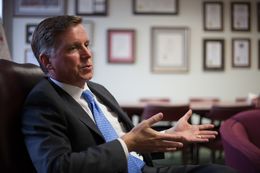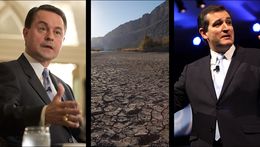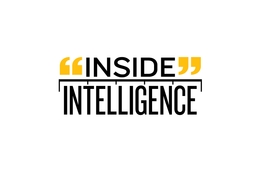
Gov. Rick Perry, House Speaker Joe Straus and state Sen. Troy Fraser have traveled to drought-stricken towns all over the state to demonstrate the importance of the vote on Proposition 6, which would provide $2 billion in new water financing.
But the implications of this year’s constitutional elections go beyond the future of Texas’ water supply. By pulling from the Rainy Day Fund instead of general appropriations, Proposition 6 may be the best chance state legislators have to fund water projects without raising taxes — the only way Republicans could back a significant commitment of state funds to infrastructure.
“We really believe that after we pass this, that we’re going to be able to fund [water] for the next 50 years,” Fraser said. “Our hope is that we never have to come back to the Legislature for money.”
At the same time, touching the state’s savings account has drawn the ire of the Tea Party, making water another issue that has driven a wedge among conservatives.
“It’s this battle within the Republican Party,” said Debra Medina, who won 19 percent of the vote in the governor's race in 2010 and is now running for comptroller. “It’s not so much a Republican-Democrat battle as it is for the heart and soul of the Republican Party.”
Indeed, while Democrats initially cried foul over using the Rainy Day Fund for water and not for public education, Proposition 6 now has widespread bipartisan support. Even liberal environmental groups like the Sierra Club are on board — though some suggest they have little choice, having fought hard during the legislative session to make sure 20 percent of projects are for water conservation or reuse.
Instead, it is the hard-core conservatives running for statewide office who are in an awkward position. While state Sen. Wendy Davis, D-Fort Worth, has enthusiastically supported Proposition 6, Republican Attorney General Greg Abbott is giving only tepid approval.
Abbott, who like Davis is running for governor, has emphasized that the measure should be a “one-time draw” from the Rainy Day Fund, even recently proposing another constitutional amendment that would limit instances in which legislators could “raid” the account. Republican Tom Pauken has said he is undecided on the water proposition. Libertarian Kathie Glass is against it.
Many other serious contenders in statewide races with a large Tea Party base of support have reacted similarly.
Medina considers herself an exception.
“You’ve got this very stark divide between those in elected office and those that aren’t,” she said of the statewide candidates’ views. “They all pledge allegiance to the same thing, but if you’re not willing to actually draw lines in the sand and actually take these tough positions ... your belief is worthless.”
Medina said the vote will be a test of whether the Tea Party base can show up and send a message to Republicans, as it has in high-profile elections like last year's U.S. Senate race. But though twice as many Texans have cast ballots early compared with the same point in 2011’s constitutional elections, the higher turnout is not expected to help the conservative cause.
The bulk of voters so far come from Houston, where Mayor Annise Parker’s re-election bid and the decision of what to do with the Astrodome have boosted turnout significantly. While the rainy region has been far less affected by drought, it is also largely Democratic, suggesting it could offset the votes Medina and others are counting on.
Nonetheless, proponents aren’t taking any chances. The Water Texas Political Action Committee, headed by Straus, Fraser and state Rep. Allan Ritter, has raised $2 million since the campaign began, spending $1.7 million in the past month. The latest campaign finance data shows a good chunk of that went to on-the-ground efforts and media buys in the Houston region. More than $1 million was spent on major media buys, including an ad with former baseball star and Texas Rangers CEO Nolan Ryan.
No such campaign frenzy has been documented on the other side, beyond Tea Party voter guides and active email lists. But Proposition 6 opponents have highlighted their grassroots nature, compared with the corporate-financed support of the measure. Among the biggest contributors to Water Texas PAC have been Dow Chemical Company, the Texas Oil and Gas Association, ConocoPhillips and Energy Future Holdings/Luminant.
Opponents have also pointed out that major industrial and construction interests have been big donors, suggesting they are jockeying for the contracts for giant water projects that are sure to come. Freese and Nichols, a major engineering consulting firm, is a major donor to the H2O4Texas PAC.
That allegation caused Bob Pence, the firm’s CEO, to chuckle.
“Heck, don’t fund it and let these emergencies occur,” Pence said. One of his firm’s biggest contracts recently, he said, was to work on a $300 million emergency pipeline needed in North Texas after the invasive zebra mussels caused fears of polluting the region’s water supply.
“It’s been a very nice deal for us,” he said.









